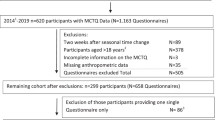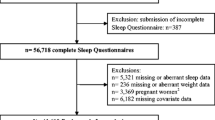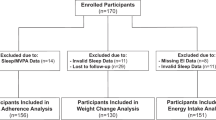Abstract
Introduction
Social jetlag (SJL), the discrepancy in sleep timing between weekdays and weekends, is associated with higher BMI and cardiometabolic risk and is common in young adults. We examined whether chronic SJL impacts weight gain in young adults participating in a weight gain prevention trial.
Methods
Young adults (n = 599, age 18–35; BMI: 21.0-30.9 kg/m2) completed assessments at 0, 4, 12, and 24 months. Multilevel mixed growth models were used to examine (1) associations between demographics and longitudinal SJL and (2) longitudinal SJL as a predictor of weight change and cardiometabolic outcomes. SJL was assessed as a continuous and clinically-significant dichotomous (< vs. ≥2 h) variable.
Results
38% of participants had clinically-significant SJL at ≥ 1 timepoints (Baseline M ± SD = 1.3±0.89). Younger (b=-0.05, p < 0.001), female (b = 0.18, p = 0.037) and Black (compared to White, b = 0.23, p = 0.045) participants were more likely to have greater SJL. Individuals with high SJL (≥ 2 h; between-person effect) were more likely to have greater weight gain over 2 years (b = 0.05, p = 0.028). High SJL did not affect the rate of change in waist circumference or cardiometabolic markers over time.
Conclusions
High SJL is associated with greater weight gain over time. Reducing SJL may positively impact weight status in young adults.


Similar content being viewed by others
Data Availability Material
Data are available at NIH/NHLBI BioLINCC.
Code Availability
Not applicable.
Bibliography/References Cited
Bass, J., & Takahashi, J. S. (2010). Circadian integration of metabolism and energetics. Science, 330(6009), 1349–1354
Billings, T., & Berg-Cross, L. (2014). Sleep competing activities and sleep problems in minority college students. Journal of Racial and Ethnic Health Disparities, 1(4), 300–308
Caliandro, R., Streng, A. A., van Kerkhof, L. W., van der Horst, G. T., & Chaves, I. (2021). Social jetlag and related risks for human health: A timely review. Nutrients, 13(12), 4543
Chandrakar, P. (2017). Social jetlag in school students: evidence to suggest that sleep deprivation during work days is common. Biological Rhythm Research, 48(1), 99–112
Chen, Y. Y., Kawachi, I., Subramanian, S., Acevedo-Garcia, D., & Lee, Y. J. (2005). Can social factors explain sex differences in insomnia? Findings from a national survey in Taiwan. Journal of Epidemiology & Community Health, 59(6), 488–494
Dutton, G. R., Kim, Y., Jacobs, D. R. Jr., Li, X., Loria, C. M., Reis, J. P., & Shikany, J. M. (2016). 25-year weight gain in a racially balanced sample of US adults: the CARDIA study. Obesity (Silver Spring, Md.), 24(9), 1962–1968
Ellison-Barnes, A., Johnson, S., & Gudzune, K. (2021). Trends in Obesity Prevalence Among Adults Aged 18 Through 25 Years, 1976–2018. Journal Of The American Medical Association, 326(20), 2073–2074
Fischer, D., Lombardi, D. A., Marucci-Wellman, H., & Roenneberg, T. (2017). Chronotypes in the US–influence of age and sex.PLoS One, 12(6), e0178782
Frech, A. (2014). Pathways to adulthood and changes in health-promoting behaviors. Advances in life course research, 19, 40–49
Gaultney, J. F. (2010). The prevalence of sleep disorders in college students: impact on academic performance. Journal of American College Health, 59(2), 91–97
Goosby, B. J., Straley, E., & Cheadle, J. E. (2017). Discrimination, sleep, and stress reactivity: Pathways to African American-White cardiometabolic risk inequities. Population Research and Policy Review, 36(5), 699–716
Gradisar, M., Wolfson, A. R., Harvey, A. G., Hale, L., Rosenberg, R., & Czeisler, C. A. (2013). The sleep and technology use of Americans: findings from the National Sleep Foundation’s 2011 Sleep in America poll. Journal of Clinical Sleep Medicine, 9(12), 1291–1299
Hales, C., Carroll, M., Fryar, C., & Ogden, C. (2020). Prevalence of obesity and severe obesity among adults: United States, 2017–2018. NCHS Data Brief. 2020; 360. In
Jakicic, J. M., Davis, K. K., Rogers, R. J., King, W. C., Marcus, M. D., Helsel, D., & Belle, S. H. (2016). Effect of wearable technology combined with a lifestyle intervention on long-term weight loss: the IDEA randomized clinical trial. Journal Of The American Medical Association, 316(11), 1161–1171
Kelly, R. M., Finn, J., Healy, U., Gallen, D., Sreenan, S., McDermott, J. H., & Coogan, A. N. (2020). Greater social jetlag associates with higher HbA1c in adults with type 2 diabetes: a cross sectional study. Sleep medicine, 66, 1–9
Kervezee, L., Kosmadopoulos, A., & Boivin, D. B. (2020). Metabolic and cardiovascular consequences of shift work: The role of circadian disruption and sleep disturbances. European Journal of Neuroscience, 51(1), 396–412
Kim, J. H., Lyu, Y. S., & Kim, S. Y. (2020). Impact of Social Jetlag on Weight Change in Adults: Korean National Health and Nutrition Examination Survey 2016–2017. International journal of environmental research and public health, 17(12), 4383
Koopman, A. D., Rauh, S. P., van ‘t Riet, E., Groeneveld, L., Van Der Heijden, A. A., Elders, P. J., & Rutters, F. (2017). The association between social jetlag, the metabolic syndrome, and type 2 diabetes mellitus in the general population: the new Hoorn study. Journal of biological rhythms, 32(4), 359–368
Lang, C. J., Reynolds, A. C., Appleton, S. L., Taylor, A. W., Gill, T. K., McEvoy, R. D., & Adams, R. A. (2018). Sociodemographic and behavioural correlates of social jetlag in Australian adults: results from the 2016 National Sleep Health Foundation Study. Sleep medicine, 51, 133–139
Lanoye, A., & LaRose, J. G. (2020). Social Jetlag and Emerging Adults’ Performance in a Behavioral Weight Loss Trial.Emerging Adulthood,2167696820982439
LaRose, J. G., Tate, D. F., Lanoye, A., Fava, J. L., Jelalian, E., Blumenthal, M., & Wing, R. R. (2019). Adapting evidence-based behavioral weight loss programs for emerging adults: A pilot randomized controlled trial. Journal of health psychology, 24(7), 870–887
Laska, M. N., Lytle, L. A., Nanney, M. S., Moe, S. G., Linde, J. A., & Hannan, P. J. (2016). Results of a 2-year randomized, controlled obesity prevention trial: Effects on diet, activity and sleep behaviors in an at-risk young adult population. Preventive medicine, 89, 230–236
Levandovski, R., Dantas, G., Fernandes, L. C., Caumo, W., Torres, I., Roenneberg, T., & Allebrandt, K. V. (2011). Depression scores associate with chronotype and social jetlag in a rural population. Chronobiology international, 28(9), 771–778
Lewis, K. H., Edwards-Hampton, S. A., & Ard, J. D. (2016). Disparities in treatment uptake and outcomes of patients with obesity in the USA. Curr Obes Rep, 5(2), 282–290
Lytle, L. A., Svetkey, L. P., Patrick, K., Belle, S. H., Fernandez, I. D., Jakicic, J. M., & Wing, R. (2014). The EARLY trials: a consortium of studies targeting weight control in young adults. Translational behavioral medicine, 4(3), 304–313
Makarem, N., Zuraikat, F. M., Aggarwal, B., Jelic, S., & St-Onge, M. P. (2020). Variability in sleep patterns: an emerging risk factor for hypertension. Current hypertension reports, 22(2), 1–10
McMahon, D. M., Burch, J. B., Wirth, M. D., Youngstedt, S. D., Hardin, J. W., Hurley, T. G., & Drenowatz, C. (2018). Persistence of social jetlag and sleep disruption in healthy young adults. Chronobiology international, 35(3), 312–328
McMahon, D. M., Burch, J. B., Youngstedt, S. D., Wirth, M. D., Hardin, J. W., Hurley, T. G., & Drenowatz, C. (2019). Relationships between chronotype, social jetlag, sleep, obesity and blood pressure in healthy young adults. Chronobiology international, 36(4), 493–509
Mohawk, J. A., Green, C. B., & Takahashi, J. S. (2012). Central and peripheral circadian clocks in mammals. Annual review of neuroscience, 35, 445–462
Mong, J. A., & Cusmano, D. M. (2016). Sex differences in sleep: impact of biological sex and sex steroids. Philosophical Transactions of the Royal Society B: Biological Sciences, 371(1688), 20150110
Morris, C. J., Yang, J. N., Garcia, J. I., Myers, S., Bozzi, I., Wang, W., & Scheer, F. A. (2015). Endogenous circadian system and circadian misalignment impact glucose tolerance via separate mechanisms in humans. Proceedings of the National Academy of Sciences, 112(17), E2225-E2234
Mulye, T. P., Park, M. J., Nelson, C. D., Adams, S. H., Irwin, C. E. Jr., & Brindis, C. D. (2009). Trends in adolescent and young adult health in the United States. Journal of Adolescent Health, 45(1), 8–24
Pan, L., Freedman, D. S., Gillespie, C., Park, S., & Sherry, B. (2011). Incidences of obesity and extreme obesity among US adults: findings from the 2009 Behavioral Risk Factor Surveillance System. Population health metrics, 9(1), 1–9
Randler, C., & Engelke, J. (2019). Gender differences in chronotype diminish with age: a meta-analysis based on morningness/chronotype questionnaires. Chronobiology international, 36(7), 888–905
Randler, C., Vollmer, C., Kalb, N., & Itzek-Greulich, H. (2019). Breakpoints of time in bed, midpoint of sleep, and social jetlag from infancy to early adulthood. Sleep medicine, 57, 80–86
Rutters, F., Lemmens, S. G., Adam, T. C., Bremmer, M. A., Elders, P. J., Nijpels, G., & Dekker, J. M. (2014). Is social jetlag associated with an adverse endocrine, behavioral, and cardiovascular risk profile? Journal of biological rhythms, 29(5), 377–383
Walsemann, K. M., Ailshire, J. A., Fisk, C. E., & Brown, L. L. (2017). Do gender and racial/ethnic disparities in sleep duration emerge in early adulthood? Evidence from a longitudinal study of US adults. Sleep medicine, 36, 133–140
Wing, R. R., Tate, D., Espeland, M., Gorin, A., LaRose, J. G., Robichaud, E. F., & Lewis, C. E. (2013). Weight gain prevention in young adults: design of the study of novel approaches to weight gain prevention (SNAP) randomized controlled trial. Bmc Public Health, 13(1), 300
Wing, R. R., Tate, D. F., Espeland, M. A., Lewis, C. E., LaRose, J. G., Gorin, A. A., & Ferguson, E. (2016). Innovative self-regulation strategies to reduce weight gain in young adults: the study of novel approaches to weight gain prevention (SNAP) randomized clinical trial. JAMA Intern Med, 176(6), 755–762
Wing, R. R., Espeland, M. A., Tate, D. F., Perdue, L. H., Bahnson, J., Polzien, K., & Lewis, C. E. (2020a). Weight Gain Over 6 Years in Young Adults: The Study of Novel Approaches to Weight Gain Prevention Randomized Trial. Obesity (Silver Spring, Md.), 28(1), 80–88
Wing, R. R., Russell, G. B., Tate, D. F., Espeland, M. A., LaRose, J. G., Gorin, A. A., & Bahnson, J. (2020b). Examining Heterogeneity of Outcomes in a Weight Gain Prevention Program for Young Adults. Obesity (Silver Spring, Md.), 28(3), 521–528
Wittmann, M., Dinich, J., Merrow, M., & Roenneberg, T. (2006). Social jetlag: misalignment of biological and social time. Chronobiology international, 23(1–2), 497–509
Wong, P. M., Hasler, B. P., Kamarck, T. W., Muldoon, M. F., & Manuck, S. B. (2015). Social jetlag, chronotype, and cardiometabolic risk. The Journal of Clinical Endocrinology & Metabolism, 100(12), 4612–4620
Zerón-Rugerio, M. F., Cambras, T., & Izquierdo-Pulido, M. (2019). Social jet lag associates negatively with the adherence to the mediterranean diet and body mass index among young adults. Nutrients, 11(8), 1756
Zuraikat, F. M., Makarem, N., Redline, S., Aggarwal, B., Jelic, S., & St-Onge, M. P. (2020). Sleep Regularity and Cardiometabolic Heath: Is Variability in Sleep Patterns a Risk Factor for Excess Adiposity and Glycemic Dysregulation? Current diabetes reports, 20(8), 1–9
Díaz-Morales, J. F., & Escribano, C. (2015). Social jetlag, academic achievement and cognitive performance: Understanding gender/sex differences. Chronobiology international, 32(6), 822-831.
Funding
This work was supported by the following grants from the National Institutes of Health: NIDDK K23DK128561, NHLBI T32HL076134 and NHLBI U01HL090864.
Author information
Authors and Affiliations
Consortia
Contributions
RRW, DFT, MAE, AAG, CEL, & EJ contributed to the design and execution of the SNAP study and JFH, LMS, AL, JGL, and RRW conceived and planned the current analysis. JFH and LMS analyzed the data. All authors contributed to the final paper.
Clinical Trial Registration
ClinicalTrials.gov Identifier NCT01183689.
Corresponding author
Ethics declarations
Conflict of interest
DFT serves on the Scientific Advisory board and receives grant funding from WW. JGL receives grant funding from WW. RRW is on the Scientific Advisory Board of Noom. The other authors declared no conflict of interest.
Ethics approval
This study was approved by the Institutional Review Board at The Miriam Hospital and University of North Carolina and was conducted in accordance with the Helsinki Declaration as revised in 2013.
Consent to participate
Written informed consent was obtained from all study participants.
Consent for publication
Not applicable.
Additional information
Publisher’s Note
Springer Nature remains neutral with regard to jurisdictional claims in published maps and institutional affiliations.
Rights and permissions
About this article
Cite this article
Hayes, J.F., Schumacher, L.M., Lanoye, A. et al. Persistent, High Levels of Social Jetlag Predict Poor Weight Outcomes in a Weight Gain Prevention Study for Young adults. J Behav Med 45, 794–803 (2022). https://doi.org/10.1007/s10865-022-00339-w
Received:
Accepted:
Published:
Issue Date:
DOI: https://doi.org/10.1007/s10865-022-00339-w




